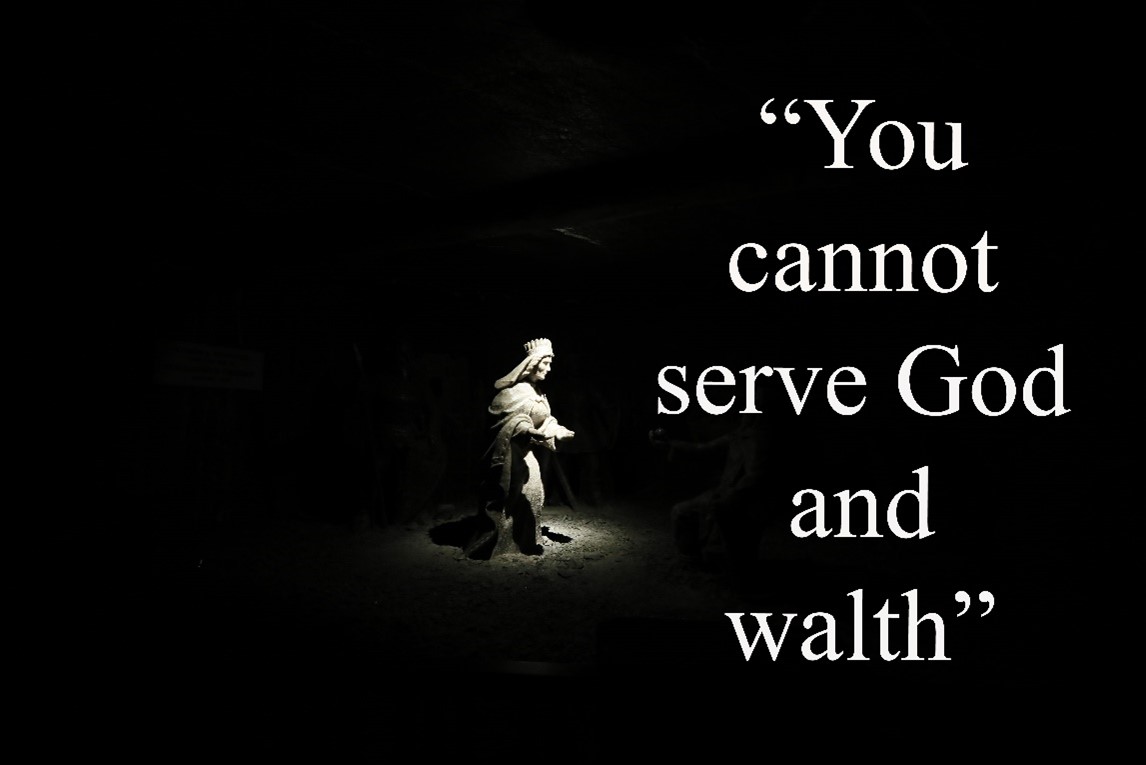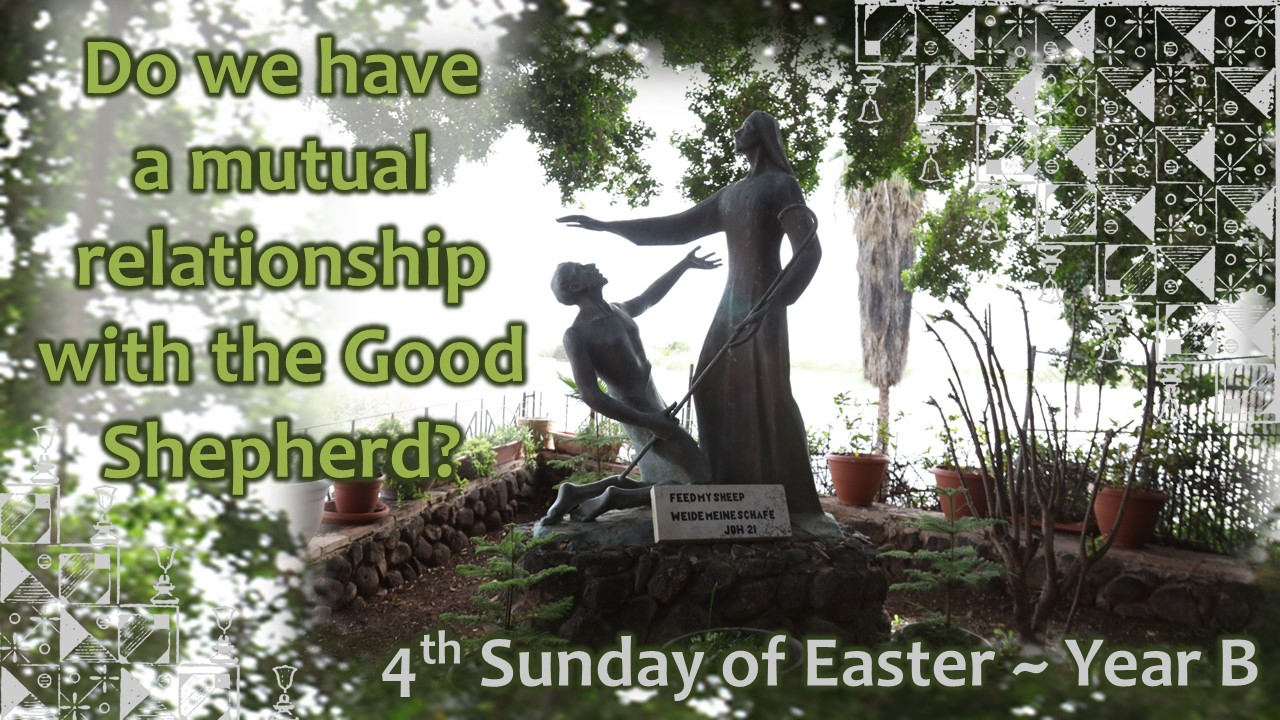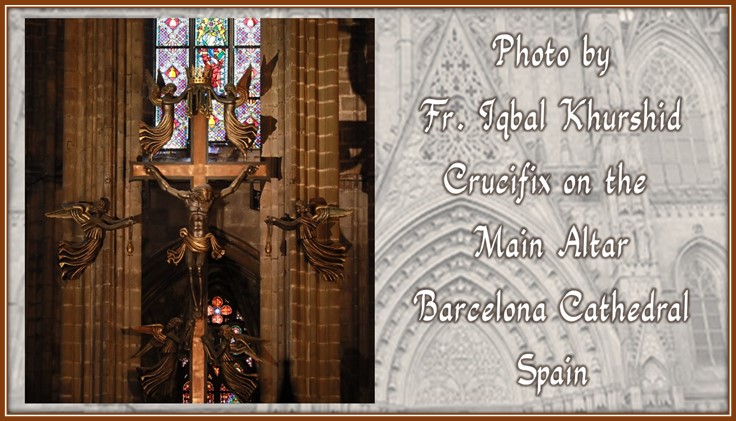
25th Sunday in Ordinary Time Year ~ September 18, 2022
Whom to Serve?
“You cannot serve God and wealth” is the key point in the Gospel today for us to examine our lives. We all love to serve the Lord but most of the time we are distracted by the things happening around us and we find great comfort in following them. It is important that we understand that we were made by God and for God (Genesis 1:26–27; Colossians 1:16–17). God is our maker (Psalm 95:6; Isaiah 54:5), our Heavenly Father (Matthew 6:26; 23:9), and He is the one we must obey (Ecclesiastes 12:13–14; Matthew 28:20; Luke 11:28). We are told that we should not allow anything in this life to become more important to us than He is: “You shall have no other gods before me” (Exodus 20:3). “And we know that the Son of God has come and has given us understanding, so that we may know him who is true; and we are in him who is true, in his Son Jesus Christ. He is the true God and eternal life. Little children, keep yourselves from idols” (1 John 5:20–21). Even the Gospel Reading of 23rd Sunday speaks about the same spirit to give up everything and follow him wholeheartedly and without partiality “In the same way, anyone of you who does not renounce all his possessions can not be my disciples. We were made by God, for God. He is our rightful master. Having a relationship with Jesus based on God’s grace and received through faith (Ephesians 2:8–9) is the only way we can serve God alone and live life as we are fully meant to live it (John 3:16–18; 10:10; Matthew 4:19) by walking with God and not with anything or anyone else (Galatians 5:16). When we choose to follow something or someone other than God, our thinking and hearts will become divided. If we prioritize anything, good or bad, such as careers, bank accounts, reputations, relationships, alcohol, lust, etc., over God, we will become slaves to them (Romans 6:16) and it will be difficult to obey, serve, and love God as we are commanded to (Matthew 22:34–40; John 15:1–17). Because we cannot do this on our own (Ephesians 2:1–9), Jesus has set us free from slavery so we can follow Him (Galatians 5:1). We get to choose God because God first chose us: “God shows his love for us in that while we were still sinners, Christ died for us” (Romans 5:8).
So now, for those who are “in Christ,” belonging to God, we can, by the work of the Holy Spirit, choose to follow God over all other would-be masters (Philippians 2:12–13; Romans 6:15–23). Because of who God is, this is in our best interest. When we are “slaves to Christ” we actually experience true life whereas being a slave to anything else ultimately leads only to death (Romans 6:23; John 15:10–11). Jesus calls us to follow Him and to leave other would-be masters behind. Jesus called Peter, James, and John, all fishermen, from their vocations (Mark 1:16–18) just as He did with Matthew, the tax-collector (Matthew 9:9). Jesus called a rich man to give up his doubleminded pursuits by selling everything he owned and then come follow Him. The man chose not to follow Him and “went away sad” (NIV) presumably because he learned that he could not serve two masters—money and Jesus (Matthew 19:16–22). Other people who met Jesus wanted to listen to Him teach and to witness and experience His miracles, but they weren’t committed to follow and obey only Him (John 6:25–71). They could not serve two masters.
Today we see so many masters in our lives to serve (I leave it up to you to figure out which master you would like to serve) and most of the time we are lost in their service to understand we have only one Master, Jesus the Lord – as he says. There is a very interesting story which though I have shared it several times with you, I felt I should share it again as it coincides with the reflection. This is by an unknown author.
Several years ago, a friend of mine and her husband were invited to spend the weekend at the husband’s employer’s home. My friend, Arlene, was nervous about the weekend. The boss was very wealthy, with a fine home on the waterway, and cars costing more than her house.
The first day and evening went well, and Arlene was delighted to have this rare glimpse into how the very wealthy live. The husband’s employer was quite generous as a host and took them to the finest restaurants. Arlene knew she would never have the opportunity to indulge in this kind of extravagance again, so she was enjoying herself immensely.
As the three of them were about to enter an exclusive restaurant that evening, the boss was walking slightly ahead of Arlene and her husband. He stopped suddenly, looking down on the pavement for a long, silent moment.
Arlene wondered if she was supposed to pass him. There was nothing on the ground except a single darkened penny that someone had dropped, and a few cigarette butts. Still silent, the man reached down and picked up the penny.
He held it up and smiled, then put it in his pocket as if he had found a great treasure. How absurd! What need did this man have for a single penny? Why would he even take the time to stop and pick it up?
Throughout dinner, the entire scene nagged at her. Finally, she could stand it no longer. She casually mentioned that her daughter once had a coin collection, and asked if the penny he had found had been of some value. A smile crept across the man’s face as he reached into his pocket for the penny and held it out for her to see. She had seen many pennies before! What was the point of this? ‘Look at it,’ he said. ‘Read what it says.’ She read the words ‘ United States of America .’ ‘No, not that; read further.’
‘One cent?’ ‘No, keep reading. ’In God we Trust?’ ‘Yes!’ ‘And… ?’
He explained, ‘And if I trust in God, the name of God is holy, even on a coin. Whenever I find a coin I see that inscription. It is written on every single United States coin, but we never seem to notice it! God drops a message right in front of me telling me to trust Him. Who am I to pass it by? When I see a coin, I pray, I stop to see if my trust IS in God at that moment. I pick the coin up as my response to God; that I do trust in Him. For a short time, at least, I cherish it as if it were gold. I think it is God’s way of starting a conversation with me. Lucky for me, God is patient and pennies are plentiful! ‘
When I was out shopping today, I found a penny on the sidewalk. I stopped and picked it up and realized that I had been worrying and fretting in my mind about things I cannot change. I read the words, ‘In God We Trust,’ and had to laugh. Yes, God, I get the message.
It seems that I have been finding an inordinate number of pennies in the last few months, but then, pennies are plentiful! And… God is patient.
If we trust in God and accept him as our Creator and Father, then there is no way that we can go against his people. In the first reading we are warned against cheating others and trampling on their rights. We could see the injustices done in the world by the rich countries and people towards the poor countries and their people. In the First Reading Amos condemns the practices that “trample the needy” and “ruin the poor.” Specifically, the prophet challenges practices that create untrustworthy markets. God does not condemn markets. Rather, God’s laws are about creating trustworthy markets, which will create social prosperity and be a fair means of exchange: “You shall have only a full and honest weight; you shall have only a full and honest measure” (Deuteronomy 25:15).
Amos also condemns those who yearn for the end of the Sabbath day, so that they can cheat their neighbors. It is well here to remember that the Sabbath day was not first-and-foremost about a time for worship, but rather was originally a justice law designed to give rest to all of society–not just to the property owner, but also “your ox and your donkey, and your livestock, and the resident alien in your towns” (Deuteronomy 5:14). But in Amos’ day, the justice sense of the laws had been lost. People longed for the justice-establishing Sabbath to be over, so that they could return to exploitation. The phrase “buying the poor for silver and the needy for a pair of sandals” refers to the practice of enslaving those in debt, even those who owed only a pair of sandals. Note how far this is from a just social order in which debts are forgiven! “Selling the sweepings of the wheat” was prohibited because these were to be left for the poor. In general, during the days of Amos, people learned to worship or serve only one master and that was money. People forgot the judgment day as all the minor prophets speak about it. Greediness has and is destroying the world because everyone wants to have everything by hook or crook. However, those who trust in the Lord lack nothing because “the Lord is our Good Shepherd and there is nothing we shall want”. If we serve him, he will provide us with everything.
One day, a woman found three old men sitting in front of her house. By seeing the three old men, the woman said:
Woman: I don’t know who you are? But it seems like you all are feeling very hungry so please come inside and have some food.
Old men: Is your husband staying inside or has he gone out?
Woman: He went out and he will be back by evening.
Old men: Let your husband come then we will come to your home.
Woman: Ok.
In the evening her husband came back home. She told her husband everything; her husband told her ok now I am home so ask them to come in and have some food.
Woman: My husband came home. Hence, now you can come in and have some food.
Old men: Yeah, but only one of us will come inside.
Woman: Why? No problem, all of you can come in and eat together.
Old men: No, you have to choose any one and the remaining two will stay out
Woman: Why are you people asking me to choose just one?
Old men: First you choose someone. Then according to that you decide we will know what to do.
Now the old men introduced themselves. Their names are Love, Wealth, and Success.
Old men: Now, choose any one of us. If you want, you can discuss with your husband
Woman: Yeah, I will discuss with my husband
Then the woman went inside her home and made discussion with her husband.
Husband: Oh, then you call wealth inside first.
Woman: No, it will be better if we call success first.
Their child listens to all this conversation and gives a suggestion.
Child: Mom and Dad. I feel that calling Love will be much better.
Father: ok we will do as our child wishes.
So, mother went out and invited Love to come in but to her surprise all three stood up and went inside. Immediately the woman said to that old man that I asked Love to come but why all three are coming inside.
Old man replied, If you invite wealth, he alone will come inside likewise success too. But you invite Love, wherever love stays, wealth and success also stay in.
Isn’t it an amazing story to help us to understand that if we choose to serve the Lord, we are going to have every blessing. (please read Colossians 3:12-17). Today, in the Gospel Jesus invites us to reflect on two opposing ways of life: the way of the world and that of the Gospel — the worldly spirit is not the spirit of Jesus — and He does so by recounting the parable of the unfaithful and corrupt steward, who is praised by the owner, despite his dishonesty. We must point out immediately that this administrator is not presented as a model to follow, but as an example of deceitfulness. This man is accused of mismanaging his master’s affairs, and before being removed, astutely he tries to ingratiate himself with the debtors, condoning part of their debt so as to ensure himself a future. Commenting on this behaviour, Jesus observes: “For the children of this world are wiser in their own generation than the children of light”. ( Please read Ephesians 6:10-20)
We are called to respond to this worldly shrewdness with Christian astuteness, which is a gift of the Holy Spirit. This is a matter of departing from the worldly spirit and values, which the devil really favours, in order to live according to the Gospel. How is worldliness manifested? Worldliness is manifested by attitudes of corruption, deception, subjugation, and it constitutes the most ill-chosen road, the road of sin, because one leads you to the other! It’s like a chain, even if — it’s true — it is generally the easiest road to travel. Instead, the spirit of the Gospel requires a serious lifestyle — serious but joyful, full of joy! — serious and challenging, marked by honesty, fairness, respect for others and their dignity, and a sense of duty. And this is Christian astuteness!
The Holy Father Pope Francis says “The journey of life necessarily involves a choice between two roads: between honesty and dishonesty, between fidelity and infidelity, between selfishness and altruism, between good and evil. You can not waver between one and the other, because they move on different and conflicting forms of logic. The prophet Elijah said to the people of Israel that went on these two roads: “You are limping with both feet!” ( 1 Kings 18:21). It’s a fine image. It is important to decide which direction to take and then, once you have chosen the right one, to walk it with enthusiasm and determination, trusting in God’s grace and the support of His Spirit. The conclusion of the Gospel passage is powerful and categorical: “No servant can serve two masters; for either he will hate the one and love the other, or he will be devoted to the one and despise the other” (Lk 16:13). (Please read 1 Peter 5:1-14)
With this teaching, Jesus today urges us to make a clear choice between Him and the worldly spirit, between the logic of corruption, of the abuse of power and greed, and that of righteousness, meekness and sharing. We must try to follow the Gospel logic of integrity, clarity in intentions and in behaviour, of fraternity, to become the instrument of justice. And we open horizons of hope for humanity. In gratuitousness and by giving of ourselves to our brothers and sisters, we serve the right master: God. If we serve him rightly then we can claim “we are unworthy servants, we only did what we ought to do” and St. Paul says “no one can separate us from the Lord of Christ…..”(Please Romans 8 chapter).
Let me conclude my reflection with this story to make you understand to choose the better Master and to serve him.
There once was a man who had two indentured servants. One day a disagreement arose between them as to who was the greatest in the eyes of their master. So they went to the master of the house and asked him, “My lord, which of us is greater?”
The master of the house replied, “I will let you discover that for yourself. I will ask each of you a question and you must answer truthfully.”
So the servants stood before him and he started to question them. To the first servant, he asked, “What do you do for me?”
“Sir, I work in the fields all day long to grow wheat for my lord’s granary,” the first servant replied. “Then, at night, I go through the house and fill all the lamps so that my lord will have light. For this you pay me a wage, but I hope that one day I may earn my freedom.”
The master nodded his head. He turned to the second indentured servant and asked, “And what do you do for me?”
“Sir,” he replied, “I am an educated man. I am well-versed in literature, music, mathematics and science. I teach your children all that I know so that one day they may leave your house and be successful in the world. And when they do, I hope that you will grant me my freedom. In the meantime, you give me a wage for what I do.”
Again, the master nodded. Then he turned to a lowly slave who was standing nearby, and asked, “And what do you do for me?”
“You know that I love you, my lord, and my only wish is to do whatever you ask,” the slave answered without hesitation. “You bought me and I know that I will be a slave for life, therefore I earn no wage. But you are kind and merciful to me, and do not beat me as other masters beat their slaves. You are wise and just and kind and that is why I love you.”
The master of the house smiled. “Then you are the greatest of all my servants and I will make you a free man.”
When they heard this, the two servants were aghast. “Why him?” they cried. “We do much more work than he does. He waits around for you to give him an order, but we labor in your fields without orders, teach your children, and light your lamps. We work unceasingly and should be rewarded.”
“Yes,” the master of the house replied. “You do work in my fields and do all the other things that you said. But this man wants only to serve me, not himself. He waits patiently until I tell him what I want him to do. His faithfulness has never failed him. He now has his reward — his freedom. And I will place him as overseer, and you will be his servants. Because of his faithful service to me — though he was once a lowly slave — he is truly the greater.”
“Slaves, obey your earthly masters with fear and trembling, in singleness of heart, as you obey Christ; not only while being watched, and in order to please them, but as slaves of Christ, doing the will of God from the heart. Render service with enthusiasm, as to the Lord and not to men and women, knowing that whatever good we do, we will receive the same again from the Lord, whether we are slaves or free. (Ephesians 6:6-8)
Who is the Master we serve?
Other Sermons In This Series

4th Sunday of Easter – Year B ~ April 21, 2024
April 19, 2024

11th Sunday in Ordinary Time Year A ~ June 18, 2023
June 16, 2023

5th Sunday of Lent Year A ~ March 26, 2023
March 24, 2023

